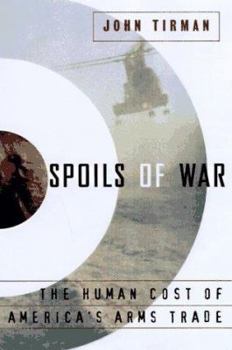Spoils of War: The Human Cost of America's Arms Trade
Select Format
Select Condition 
Book Overview
Provides an account of the intricacies of the politics, finances, unpleasantness, and the hypocrisy of American arms trading, tracing the use of assault weapons in various human rights disasters and... This description may be from another edition of this product.
Format:Hardcover
Language:English
ISBN:0684827263
ISBN13:9780684827261
Release Date:October 1997
Publisher:Free Press
Length:310 Pages
Weight:0.05 lbs.
Dimensions:1.0" x 6.5" x 9.6"
Customer Reviews
2 ratings
definitely worth reading
Published by Thriftbooks.com User , 21 years ago
I read this when it was first published a while back. Tirman outlines how the U.S. defense industry, helicopters and small arms in particular, was kept alive by conflicts in the Middle East and Central Asia during President Reagan's administration, by the numbers. I'm not surprised the Turkish reviewer didn't like his take. Mr. Tirman accuses Turkey of persecuting Kurds much more than Saddam Hussein (the anti-Kurd in American mainstream media), with American hardware. But you don't have to listen to any academic discourse; he lets the numbers speak for themselves. Turkey was the biggest recipient of U.S. military aid until recently, and the only Middle Eastern country to be involved in F-16 fighter production.Mr. Tirman also outlines American involvement in Iran while supporting the Shah (King), in Afghanistan while supporting the Mujahideen, and gives a very simple, believable explanation of why Israel has become the recipient of so much American military aid.To my knowledge there has been no serious criticism of Mr. Tirman's book and certainly nobody has refuted his numbers, which are a matter of public record but startling to read as he puts them together.
solid review of u.s. foreign arms sales policy failures
Published by Thriftbooks.com User , 26 years ago
Spoils of War by Spiros Rizopoulos, Senior Associate, The Western Policy Center Spoils of War, John Tirman's analytical work on U.S. arms sales to allies, challenges the political and moral rationale behind U.S. foreign policy choices, particularly during the period from 1968 to the present, and criticizes the standards by which the United States has selected its "favorite" allies during this period. Tirman provides insight into the relationship between U.S. interests abroad and the aid Washington has given its allies, particularly Turkey. He also explores the role of pork barrel money in strengthening U.S. domestic industrial interests concerning the sale of arms to these allies. Tirman begins the book by describing the historical rivalry between the civilizations of the West and the East, which began in 2,000 B.C. and led to the Crusades and the occupation of Christian Constantinople by the Ottomans in 1453, marking the beginning of the Ottoman Empire. According to Tirman, cooperation between Christian countries of the West and Muslim countries of the East, such as the alliance between the United States and Turkey, is not viable today because of historical antagonisms stemming from the Crusaders' efforts to contain the spread of Islam. To illustrate this conclusion, Tirman describes Washington's relationship with Iran in the 1970s. Under the Nixon administration, the only way the U.S. was able to avoid being hurt by the Shah of Iran's proposal that OPEC members limit their oil exports to the West was to sell arms to Iran in exchange for oil. Additional factors justifying this policy, according to this administration, were the end of Britain's presence as a colonial power in the region, the decline of Russian intervention in the Middle East, and the hostilities between Egypt and Israel. However, as the United States was providing military aid to the Shah, he was engaging in acts of oppression against his people, creating negative public opinion! domestically and causing a strong anti-American sentiment within the country. This sentiment has dominated Iranian policies toward the U.S. since Ayatollah Khomeini succeeded the Shah in early 1979. A country that was once an important U.S. ally became a dangerous enemy. Khomeini lost no time showing how he could endanger U.S. interests in the region. In November 1979, he began holding diplomats from the U.S. Embassy in Tehran hostage for 444 days, indicating that he was ready to engage in hostile actions against the U.S. The irony in this situation was that this aggression was backed up by weapons supplied to his predecessor by the United States. With the loss of Iran as an ally, Washington strengthened its relationship with fellow NATO member Turkey because of its ideal geographical location, bordering the Soviet Union, Iran, Iraq, and Syria, and its history of military coups led by pro-Western generals who could serve U.S. interests without major political opposition. The Soviet invasion of





